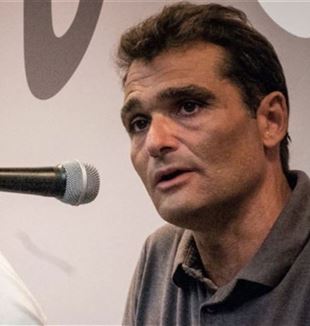
Mencarelli: the intensity of the unexpected
A dialogue with the Roman writer and poet on the themes that will be addressed during the meeting on education on January 30. During the pandemic he met online with 10 thousand students in 300 schools. The challenge of educating "with one's own life"."What he said came to me as if it were true. Indeed, it is true.” This phrase is often repeated in the messages sent by young people to Daniele Mencarelli, after their meetings about his books La casa degli sguardi [The house of gazes] and Tutto chiede salvezza [Everything asks for salvation] . Since the first lockdown in March until today, he has "gone" to more than 300 high schools throughout Italy, meeting more than 10,000 students. All strictly online. "I often have to work two shifts in the same school complex. It is always a new adventure, a fight between my freedom and theirs".
In their letter to Corriere della Sera, the teachers talk precisely about freedom.
Exactly. That is the first thing that struck me. Adults often have the idea that young people have something less, and because they are always glued to their cell phones and tablets, it is difficult to establish a relationship with them. When people say this to me, I reply that with young people it is as if you have to remove a layer of dust for them to come to terms with the world in which they live. Each generation is born with the profound intention of betting upon its own freedom, the problem lies with the adult, what they offer, the example they set. In this sense, Pasolini’s phrase, which is quoted in the letter, says it all. My experience of these months has told me that via video this freedom is even more at stake because we are denied bodily communication. Often, from a verbal point of view, you have to get to that face-to-face. It is a matter of intensity.
In what sense?
Beautiful words are not enough, one must bring one's own vitality to the table, one must offer intensity. Young people see in me a person who is not afraid to indulge his vitality. I am not a teacher, I do not teach a subject, I propose the adventure of literature, but starting from my human journey. In books, as in meetings, I bet on my humanity. I test myself on their own ground.
An example?
For me, love goes hand in hand with loss, because I live it from its natural limit, which is death, lack. And to the young people I say: "Raise your hand if, looking at your mother, brother, girlfriend, you have not tasted, even for a few moments, the pain of loss, of their decadence.” Of course, I would be much happier to have these meetings in person, but these are the circumstance. It is a bigger bet, as you can see from the article. Man is so great that he can make the unexpected, the difficult, an element of greater momentum and freedom.
In this case, the "unexpected" for teachers is distance learning, and for you it is having to meet them on different platforms.
Young people provoke you via video, and I mean that positively. On Zoom they do not just manifest the desire for knowledge, to study, to undertake an academic path, they manifest a need. In moments of difficulty they ask for a certain type of "vigilance", that is, the transmission of knowledge must be linked to the contingent moment. Like during war, lessons are given, but they must be constantly linked to the context. I have to add that, for some, video fosters the relationship. They are teenagers, the age of shyness and insecurity about their bodies. Only showing one's face, sometimes not even that, allows them to say things that they might not have the courage to say in front of their classmates.
In your dialogues with the young people, what question keeps coming up?
If I have reviewed the characters in my books again: the five Tso madmen, the hospital work colleagues, the nun. Because they are so important, so fundamental for the protagonist. Ingrained in them is the feeling that it is the other who brings the surprise that changes our lives. That the other saves me, makes me grow. This rekindles in them the possibility of trust in the other, even to the point of forgiveness.
Read also - Growing and helping others grow in a pandemic
At the end of the day, I feel like they are talking about friendship.
What I say about mature friendship, which is not just fun, is that it gives you the saving opportunity to speak continually about what you feel. I provoke them by saying: you are scared, but what hurts you most is that you do not stop talking to your friends but without telling them what you feel deep down. The gift of friendship is just that: feeling in continuity with what I feel, even if it is sadness. Many write to me or ask to chime in saying that this is exactly what they are looking for.
While what do teachers ask for?
I have met many teachers who have accepted the challenge of distance learning and go all the way. There are those who have more literary questions, about who my teachers were, for example, and those who ask me: "But how do you do it? What are the resources you point to in order to dialogue with the kids?" My answer is always the same: the intensity of my life. Sure, I give examples that are attached to their lives, but that is what counts. I tell them: I do not have recipes. I give the kids myself, what I live, the truth of me.#Education